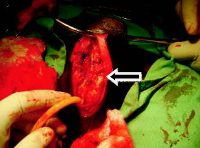Primary carcinoma of anterior urethra presenting as a benign urethral stricture disease - Case report
Main Article Content
Abstract
Background: Primary cancers of the male urethra are rare and only few cases have been reported. Primary urethral cancer, the only urological malignancy that is more common in females; accounts for less than 1% of all urological malignancies. The rarity of this disease thus present with challenges in diagnosis. It is on this background that this case of primary male urethral cancer initially diagnosed as urethral stricture disease is reported for its rarity.
Method: The case note of the patient was retrieved and the management reviewed. Relevant literature search was also done.
Results: A 43 year old man presented with a four month history of progressive diminution of urine stream associated with obstructive lower urinary tract symptoms and acute urinary retention. There was no history of trauma, but he had a past history of urethritis 15 years earlier which was treated with antibiotics. Evaluation showed a 1.0cm x l.0 cm indurated mass with urethrocutaneous fistula at mid-shaft of penis. Supra-pubic cystostomy was done after failed catheterization. A clinical diagnosis of post inflammatory urethral stricture was made. Rectrograde and micturating cysto-urethrogram showed a long segment, 3.5 cm peno-bulbar anterior urethral stricture with urethrocutaneous fistula at mid-shaft of penis. He was then planned for a substitution urethroplasty. Intra-operatively, the strictured segment appeared abnormal with a mass invading the corpora carvenosa. Biopsy showed primary squamous cell carcinoma of the urethra. He was counseled for penectomy with perineal urethrostomy for optimal oncological control. He refused surgery. The tumor rapidly progressed and spread further proximally along the shaft of the penis. Three weeks later, he gave consent for total penectomy with perineal urethrostomy which was done.
Conclusion: Urethral cancers are rare. Early presentation by the patient and a heightened index of index of suspicion will reduce the need for radical surgeries which is often not desirable
Downloads
Article Details
Section

This work is licensed under a Creative Commons Attribution-NonCommercial-NoDerivatives 4.0 International License.
The Journal is owned, published and copyrighted by the Nigerian Medical Association, River state Branch. The copyright of papers published are vested in the journal and the publisher. In line with our open access policy and the Creative Commons Attribution License policy authors are allowed to share their work with an acknowledgement of the work's authorship and initial publication in this journal.
This is an open access journal which means that all content is freely available without charge to the user or his/her institution. Users are allowed to read, download, copy, distribute, print, search, or link to the full texts of the articles in this journal without asking prior permission from the publisher or the author.
The use of general descriptive names, trade names, trademarks, and so forth in this publication, even if not specifically identified, does not imply that these names are not protected by the relevant laws and regulations. While the advice and information in this journal are believed to be true and accurate on the date of its going to press, neither the authors, the editors, nor the publisher can accept any legal responsibility for any errors or omissions that may be made. The publisher makes no warranty, express or implied, with respect to the material contained herein.
TNHJ also supports open access archiving of articles published in the journal after three months of publication. Authors are permitted and encouraged to post their work online (e.g, in institutional repositories or on their website) within the stated period, as it can lead to productive exchanges, as well as earlier and greater citation of published work (See The Effect of Open Access). All requests for permission for open access archiving outside this period should be sent to the editor via email to editor@tnhjph.com.

